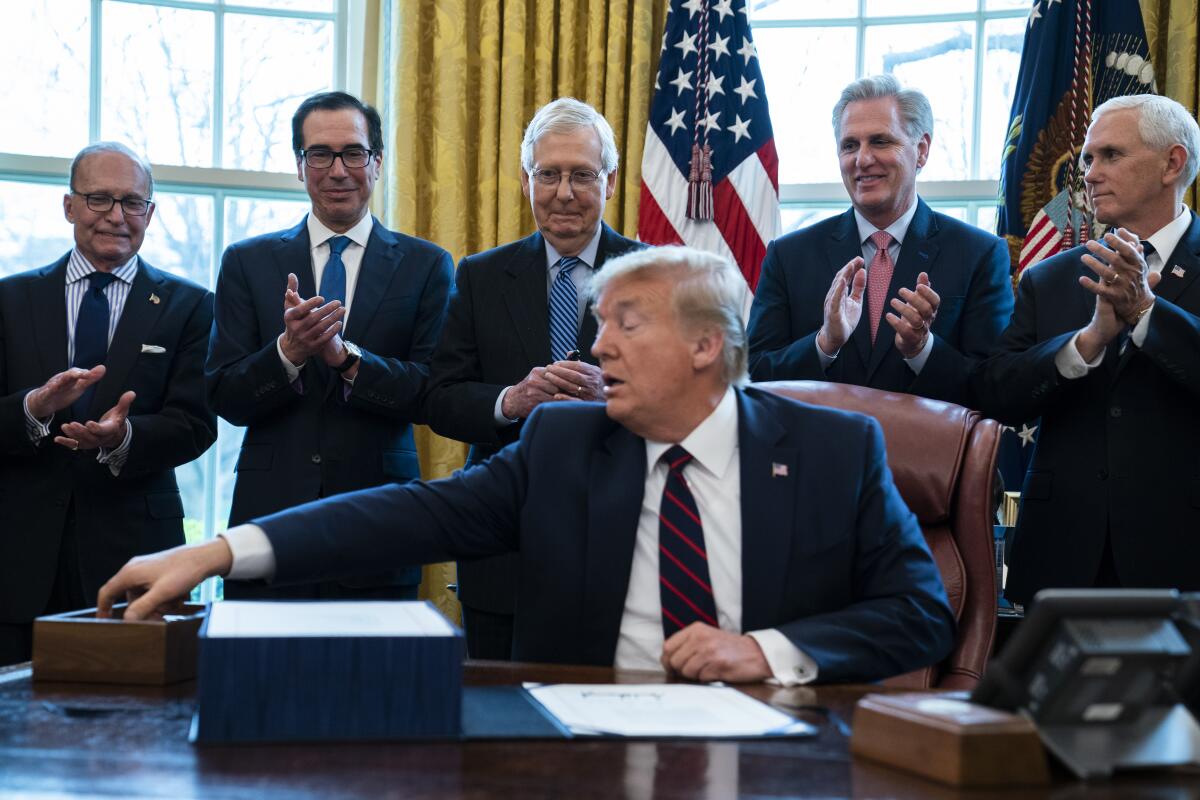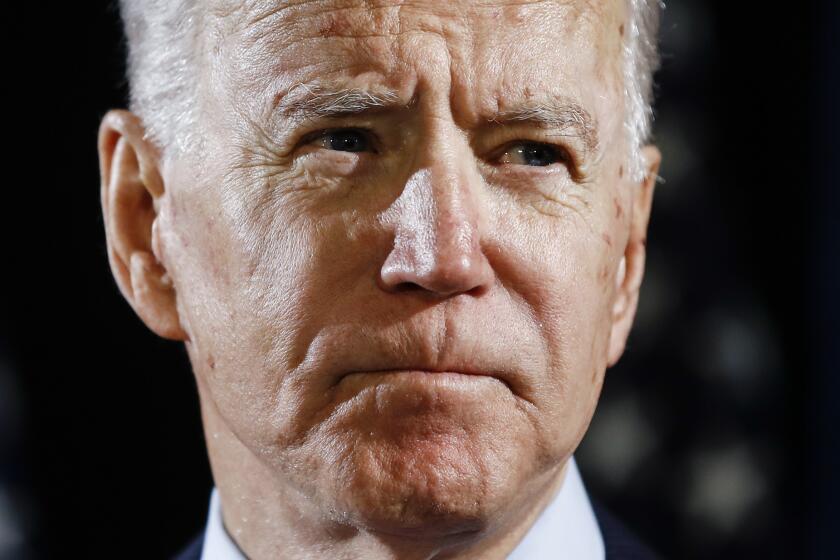Trump signs $2-trillion coronavirus stimulus package and orders production of ventilators

- Share via
WASHINGTON — President Trump on Friday ordered General Motors to produce ventilators for hospitals strained by COVID-19 patients, and signed into law the largest rescue measure in history, a $2-trillion economic relief package to get money to many Americans as well as hospitals, businesses, and state and local governments struggling with the pandemic.
Trump used his power under the 1950 Defense Production Act to issue the order to GM, just a day after he’d dismissed calls from governors and hospitals for tens of thousands of the devices. He had been widely criticized for not acting sooner, as doctors from California to New York have complained of shortages that threatened to cost many lives.
His actions came on a day when the United States surpassed all other nations in confirmed cases of the coronavirus infection, now exceeding 100,000. The number of dead approached 1,500 as he signed the economic relief measure into law.
As those numbers climbed, Trump seemed to take a more cautious tone about scaling back restrictions on public gatherings and other activities. After days of suggesting he wanted to relax federal guidelines and get people back to work by Easter, Trump sounded more tentative at a White House briefing.
“I certainly want to get it open as soon as possible,” he said. “I don’t want it to be long, but we also have to open safe.” He added he would listen to scientific advice in evaluating the situation next week.
Although he touted the number of ventilators the U.S. would be producing, Trump declined to guarantee they would be built quickly enough to ensure that every patient who needs a ventilator would get one.
Joe Biden says nationwide shutdown of nonessential businesses is needed now to stop the coronavirus pandemic.
“We’re in great shape,” he said. “I hope that’s the case.” When pressed by a reporter on the question, the president waved him off, saying, “Don’t be cutie pie.”
Until Friday, Trump had said he didn’t need to invoke his authority under the defense production law because businesses were voluntarily retooling to make needed medical supplies, including protective masks for healthcare workers. In a statement, however, he suggested GM was driving too hard a bargain.
“Our fight against the virus is too urgent to allow the give-and-take of the contracting process to continue to run its normal course,” he said. “GM was wasting time.”
In tweets, Trump further assailed the automaker and its chief executive, Mary Barra, as well as Ford. In one, he wrote, “General Motors MUST immediately open their stupidly abandoned Lordstown plant in Ohio, or some other plant, and START MAKING VENTILATORS, NOW!!!!!! FORD, GET GOING ON VENTILATORS, FAST!!!!!!”
Some experts noted that Trump’s use of the Korean War-era act was unusual for prodding a single company to produce items, rather than force an industry generally to made necessary goods in a time of war or national crisis.
Nicolas Vyas, the executive director at the Center for Global Supply Chain Management at USC, said he was pleased Trump acted but disappointed he did so in such a limited way. Vyas said the president’s order seemed spiteful, and urged the federal government to use the law more aggressively.
As medical providers plead for help, the White House won’t detail a plan to route masks, ventilators to the front lines of the coronavirus fight.
“This is not how you should be thinking during a time of huge national crisis,” Vyas said. “We need a holistic approach. We need to bring experts and industry together to pool capabilities and to come up with a comprehensive solution. Why are we playing around and doing this marginal execution rather than execution?”
Public health experts and state and local leaders also have been urging Trump to use the law to boost production of personal protective equipment, such as masks and scrubs. Ventilators, however, are an increasingly scarce lifesaver for patients with COVID-19, the disease caused by the coronavirus, and suffering acute respiratory distress.
Trump’s order marked a turnaround for him. On Thursday, he had criticized Democratic governors pleading for more ventilators and told Fox News host Sean Hannity: “I don’t believe you need 40,000 or 30,000 ventilators.... You know, you go into major hospitals sometimes and they’ll have two ventilators and now all of a sudden they’re saying, ‘Can we order 30,000 ventilators?’”
On Friday, Trump said he still hoped that the U.S. would not need all the ventilators it would be making and could export some to Britain, Italy, Spain and Germany. “They’re all calling for ventilators. We’re going to make a lot of ventilators,” he said.
Even as Trump promised to send more ventilators to states hit hard by the pandemic, he renewed his feud with some of the governors of those states.
He said he had told Vice President Mike Pence, the head of his coronavirus task force, “Don’t call the woman in Michigan” — a reference to Gov. Gretchen Whitmer — or “the governor of Washington,” Jay Inslee, both Democrats.
The latest maps and charts on the spread of COVID-19 in California.
“You know what I say? If they don’t treat you right, I don’t call,” he said, adding, “I want them to be appreciative.” Pence called the two governors anyway, Trump conceded.
The president’s order to GM followed a White House ceremony in the afternoon, where he signed the $2-trillion relief package just hours after the House approved the bill by a voice vote.
“I want to thank Democrats and Republicans for coming together and putting America first,” Trump said at the ceremony.
The Senate had passed the legislation 96 to 0 on Wednesday following extensive negotiations between Democrats and Treasury Secretary Steven T. Mnuchin, significantly altering and expanding a package initially proposed by Senate Majority Leader Mitch McConnell (R-Ky.)
The fact that Democrats and Republicans could come together behind the package in otherwise polarized times reflected the severity of the health and economic crisis gripping the country. The parties’ unanimity was especially remarkable given the unprecedented cost of the measure, an amount equal to more than half of the $3.6 trillion in tax revenue that the U.S. government expects to collects this year.
Yet the bipartisanship did not extend to Trump’s signing ceremony. He did not invite any Democrats to the White House, only McConnell, House Minority Leader Kevin McCarthy of Bakersfield and three other senior House Republicans. He and House Speaker Nancy Pelosi (D-San Francisco) have not spoken in months.
A statement he issued after the bill-signing is certain to provoke the Democrats. In it, the president said he would ignore several provisions they negotiated with Mnuchin giving Congress oversight of how the administration disperses $500 billion in loans to corporations. One would create an office of an inspector general at the Treasury Department to monitor its decisions.
The oversight provisions infringed on presidential powers under the Constitution, Trump said.
The relief provisions would touch many aspects of American life. Along with providing aone-time direct payout of up to $1,200 for most American adults, the bill includes $500 billion in loans to struggling businesses, $377 billion in loans and grants for small businesses, $150 billion for local, state and tribal governments facing a drop in revenue and $130 billion for hospitals dealing with anonslaught of patients.
The package also blocks foreclosures and evictions during the crisis on properties where the federal government backs the mortgage; pauses federal student loan payments for six months and waives the interest; gives states millions of dollars to begin planning for the November election by offering mail or early voting, and provides more than $25 billion for food assistance programs such as SNAP.
It expanded who qualifies for unemployment assistance to include people who were furloughed, gig workers and freelancers. Coming after a week in which a record 3.3 million Americans applied for unemployment benefits, the measure provided a $600 increase in jobless benefits for four months, on top of what states provide as base compensation, and extended by 13 weeks the duration of benefits, which is typically 26 weeks.
House Democratic leaders have already begun talking about the need for a fourth relief package. Pelosi on Thursday told reporters that it should include provisions for workers’ paid leave and safety protections, for covering the cost of COVID-19 treatments and for yet more funding for food stamps and state and local governments.
“We know that this cannot be our final bill,” Pelosi said on the House floor Friday, adding that it is a “downpayment” toward what American workers, businesses and hospitals will need.
Trump later seemed to agree that additional aid would be needed, particularly for states. However, McCarthy told reporters Thursday he’s not ready to begin discussing a fourth package. “Let’s let this bill work,” he said.
The final vote did not go exactly as the Democratic and Republican House leaders planned. Maverick Republican Rep. Thomas Massie, a libertarian conservative from Kentucky, demanded that a majority of members be present and that each lawmaker’s vote be recorded.
Massie cited the Constitution to support his action, and acted despite withering attacks from Trump on Twitter. The president called Massie “a third rate Grandstander” and called for him to be ousted from the party.
Congressional leaders had hoped to hold a simple voice vote, to protect members from potentially contracting the coronavirus by traveling and gathering in the Capitol. Based on Massie’s earlier threat that he would insist on a quorum — 216 members at the moment — they summoned lawmakers back, forcing lawmakers to drive or find last-minute flights.
House leaders used a procedural move to quash Massie’s motion for a recorded roll call of lawmakers. When Massie called a second time for a roll call vote, he failed to get a fifth of those lawmakers present to support him, as required by House rules. If he had succeeded, the move likely would have delayed passage of the bill until Saturday, when additional lawmakers could return.
After more than three hours of debate, the $2-trillion bill passed by a voice vote in just under a minute.
Times staff writers Noah Bierman and Chris Megerian contributed to this report.















